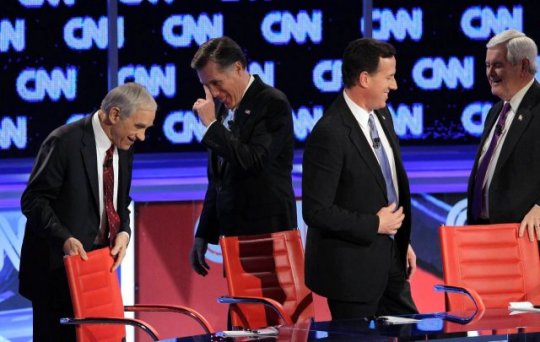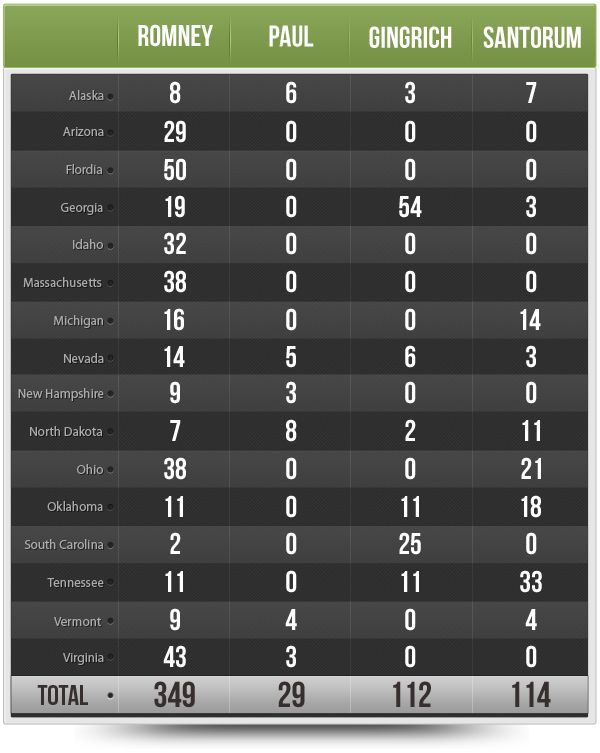Aftermath of Super Tuesday Split Decision

Republicans held their Super Tuesday election contests earlier this week and despite media build-up, it was a decidedly split decision. As IVN reported earlier, this split means the Republican primary season is likely to stretch much longer. With the results of 10 races, four facts were re-established.
Ohio Primary Voters Reject Extremism
Senator Santorum is losing because he has major and substantial on-going problems with Catholic voters – particularly Catholic women voters who are turned off by his extreme social conservatism. Governor Romney won Ohio due to those Catholic voters - principally the Catholic women decisively rejected Sen. Santorum.
A byproduct of this trend was the nature of the Ohio Congressional delegation changed, with voters rejecting extremist incumbents on both sides of the aisle. In the Cincinnati Suburbs, Congresswoman Jean Schmidt, the Ohio version of former GOP nominee Rep. Michele Bachmann, lost her primary to Brad Wenstrup, a less polarizing individual who is more Libertarian Conservative. In addition, Congressman Dennis Kucinich, arguably the left wing version of Michele Bachmann, decisively lost his primary to Congresswoman Marcy Kaptur.
The social issues that seem to animate Sen. Santorum’s campaign are losing their traction.

Santorum's Inadequate Campaign Organization
Sen. Santorum is a disorganized candidate with a campaign incapable of performing the nuts and bolts of electioneering. If Sen. Santorum fell short of a victory in Washington State due to unappealing social rhetoric, Ohio proved to be an organizational nightmare. In terms of the delegate count, Sen. Santorum’s lack of structure showed in Ohio.
According to Ohio Republican Party rules, Sen. Santorum was ineligible to receive up to 18 of Ohio’s 63 delegates at issue. He was ineligible for nine delegates because he failed to register delegates in three of Ohio’s 16 congressional districts. But he also failed to file complete three-delegate slates in six other districts, including two in Southwest Ohio.
Because of the results, Sen. Santorum forfeited at least seven delegates that he otherwise would have won. In terms of where those delegates go, three of those delegates go to Gov. Romney and the remaining four are unallocated with Republican Party officials making the ultimate decision. The establishment getting to pick their choice is bad news for Sen. Santorum.
Gov. Romney’s campaign noted that this disorganization was evidence that Sen. Santorum is not “ready for prime time,” as Ben Ginsberg, Gov. Romney's campaign national counsel, said in a conference call with reporters last Saturday. Mr. Ginsberg stated that getting on the ballot in every state is “a true test” of whether a candidate has the organizational muscle for the general election. The same criticism can be applied to any of the other candidates, except for Ron Paul, who appeared on all the ballots.
It is awfully presumptuous of Sen, Santorum, in light of Super Tuesday, having his campaign call on conservatives to pressure former Speaker Newt Gingrich to abandon his bid for the White House. There is no indication that Gingrich voters would in fact vote for Sen. Santorum. Moreover, what is driving this competition is the way Gov. Romney is running his campaign. He is making it less likely that anyone will drop out.
Mitt Romney's Road To Nomination Still Tricky
Despite his lead and the shortcomings of his competitors, Gov. Romney remains a very, very weak candidate who may yet blow the nomination.
In terms of the delegate allocation, here is the hard count based on the most recent estimates of delegates actually awarded:

For Gov. Romney, be it his LDS faith or otherwise, he has tremendous problems as a candidate –particularly in the South. In Virginia, which is a presidential swing state, Dr. Paul got 42% of the vote and three delegates, in a non-campaign effort. In Vermont, a state Gov. Romney should have swept, he split the delegates with Dr. Paul and Sen. Santorum. The sole southern state that he might have won with some effort is Tennessee, but he hit his 28% ceiling and stalled out, ultimately losing the state to Sen. Santorum. As consolation, Gov. Romney did pull in delegates in Georgia, Oklahoma, and Tennessee. This trend will likely continue next week in Alabama, Kansas, and Mississippi, where Romney is expected to lose, yet pick up some delegates.
Gov. Romney's problem is that large portions of the Republican party still do not want him. As former California Senate Republican Leader Jim Brulte once noted, “You are not a leader until you take your caucus where it did not want to go”. Liberals have experienced this firsthand with President Obama. For all the complaining within by the so-called “Professional Left”, President Obama has taken the Democratic Party to places where it did not initially want to go. In doing so, he has mostly delivered on core Democratic objectives.
The same was true of George Bush 43, Bill Clinton, Ronald Reagan, John F. Kennedy, Harry Truman, and Franklin Delano Roosevelt. They were allowed some flexibility because the vast majority of the party core trusted them to “watch their back”. The same cannot be said of Governor Romney.
The former Massachusetts Governor has various supporters that are antithetical to the GOP's conservative wing. Indeed, many of his Super PAC funders are gay or have gay immediate family members. Many business groups pushing “green technology” are also some of his biggest funders. Gov. Romney’s campaign has recently put out a series of memos explaining that his opponents cannot get to 1144 delegates – all true, but he has not shown how he is going to get close to that number himself. Given questions raised as to the nature of awarding delegates, Gov. Romney’s allocation in Arizona, Florida, Michigan, and Ohio maybe challenged in Tampa at a contested Republican Convention.
What Gov. Romney needs to do is to have a "Sister Souljah" moment with the Republican Party and tell them to grow up. Republicans might welcome that no nonsense approach. Either way, Gov. Romney might want to follow the lead of his wife Anne, whose campaigning among women in Ohio delivered the state to him.
What's Next
Kansas Caucuses will be held this Saturday, Mississippi and Alabama follow with primaries on March 13th. Caucuses next week include Hawaii and Missouri. Sen. Sentorum "won" Missouri's "beauty contest" back in February, however won't be held until next Saturday. It's in Kansas and Missouri that Dr. Paul is campaigning, on par with his team's strategy to target accruing pledged delegates.
In all, the biggest winner coming out of Super Tuesday was likely President Obama.
David Axelrod told reporters on a conference call, “Instead of Super Tuesday, it became Super Glue Day for them. They’re still stuck with Santorum and with Gingrich and with the prospect of a long race here.”






